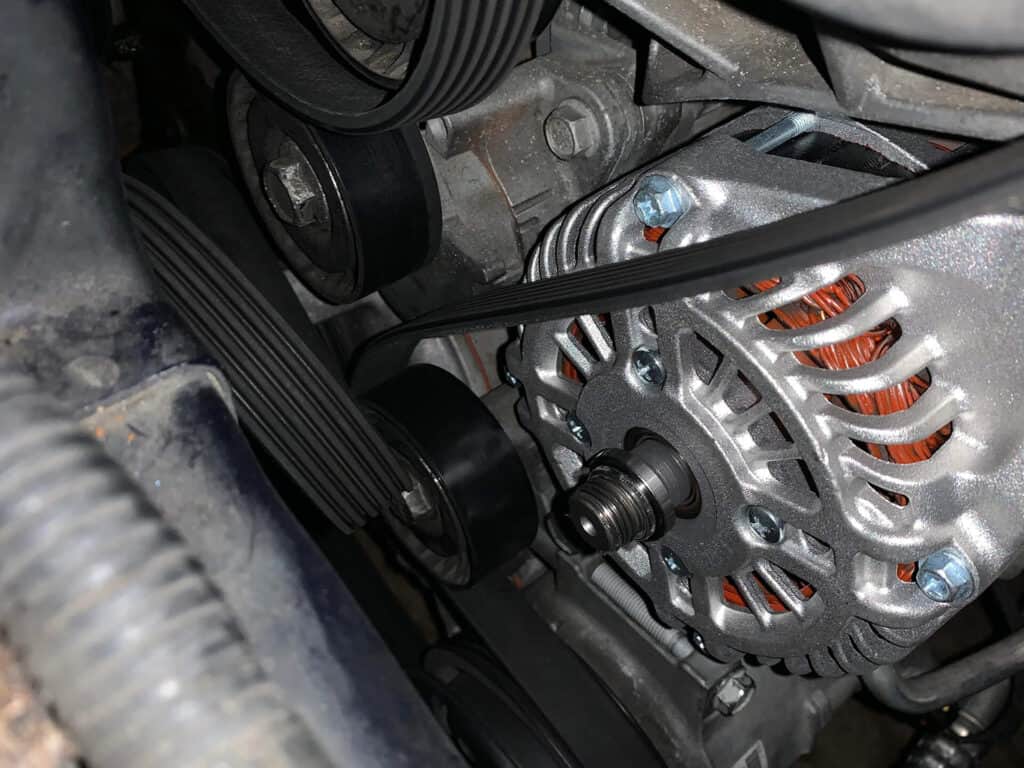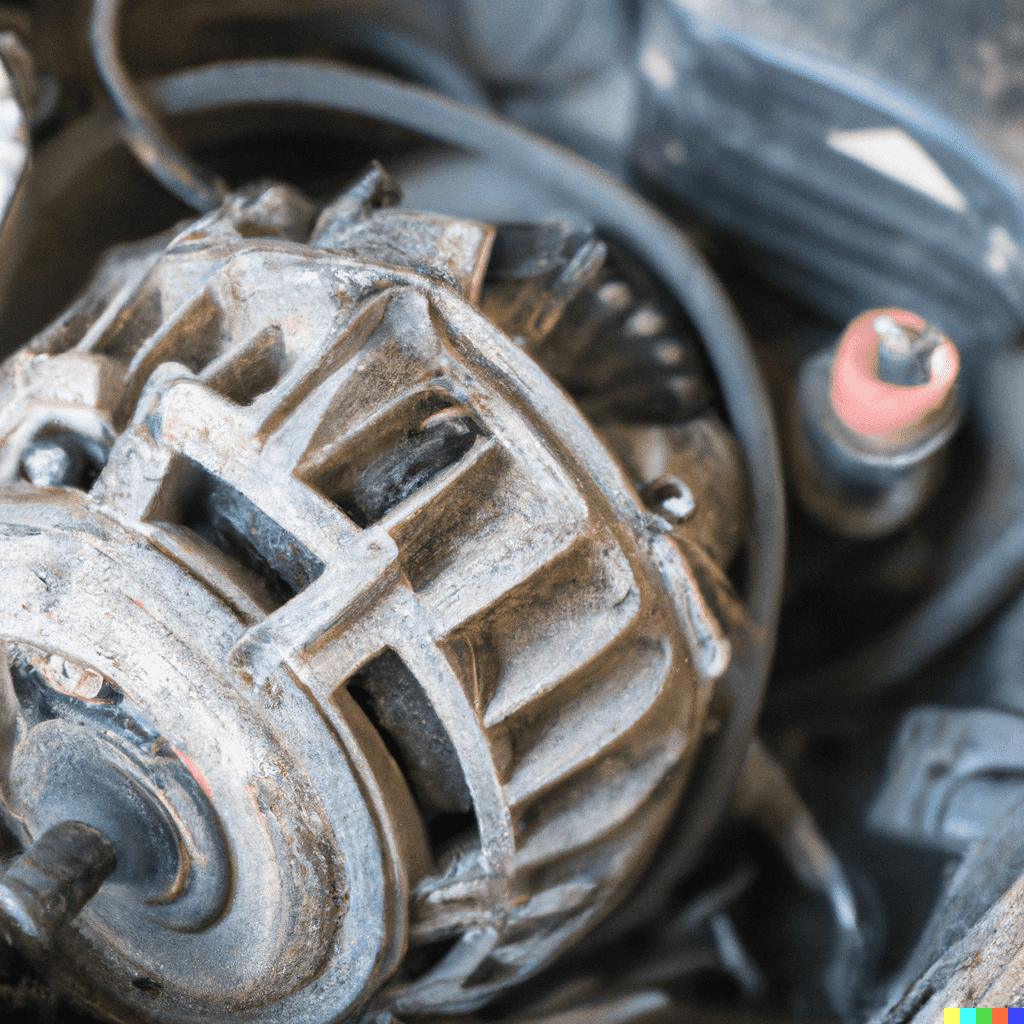As a car owner, you never want to be caught in a situation where your vehicle won’t start. One of the most common causes of a car that won’t start is a bad or failing alternator. The alternator is responsible for generating power to charge your car’s battery and keep your electrical components running. If your alternator is failing, it can cause a range of problems that are important to recognize early on. In this article, we’ll go over nine warning signs of a bad or failing alternator that you should be aware of to avoid getting stranded on the road.

9 Warning Signs of a Bad or Failing Alternator
Dimming Headlights
One of the most noticeable signs of a failing alternator is when your headlights begin to dim. This is a sign that your car’s electrical system isn’t getting enough power to keep the lights shining bright.
Warning Light
A warning light on your dashboard that looks like a battery or says “ALT” is a clear sign that there’s an issue with your alternator.
Battery Issues
If your car’s battery dies frequently or loses power quickly, it could be due to a failing alternator. The battery needs a constant supply of power to stay charged and if the alternator isn’t functioning correctly, it can’t keep up with the demand.
Strange Noises
Alternators often make a low whining or grinding noise when they’re going bad. This sound usually occurs when you’re starting your car or when you’re turning on an electrical component.
Electrical Problems
If your car’s electrical components are not working properly, it could be due to a failing alternator. Some common issues include dimming interior lights, a radio that won’t turn on, or power windows that are slow to move.
Burning Smell
A burning smell coming from your car’s engine could indicate that the alternator is overheating. This can be a serious issue and requires immediate attention to prevent further damage.
Stalling
A car that stalls while driving can be a sign of a failing alternator. If your alternator is unable to provide enough power to keep your car running, it could shut down the engine.
Slow Start
If you’re experiencing slow cranking when you start your car, it could be a sign that your alternator isn’t functioning properly. This could also be a sign of a dying battery, so it’s important to get it checked out as soon as possible.
Dashboard Flickering
If you notice your car’s dashboard lights flickering, it could be due to a bad alternator. The fluctuation of power supply can cause your gauges and warning lights to act erratically.
How to determine if the alternator or battery is dead?
There are a few common signs that can help you determine whether it’s the battery or the alternator that’s causing issues with your vehicle’s electrical system.
Check the dashboard warning lights
If the battery warning light is on, it could be an indication of a problem with the alternator. If the other warning lights on the dashboard are on, it may be a sign of a battery issue.
Check the headlights
If the headlights are dim or flickering, it may be a sign of an alternator problem. If the headlights are bright and stay steady, the issue is more likely a battery problem.
Check the electrical accessories
If the electrical accessories, such as the radio and air conditioning, are not working properly, it may be a sign of an alternator issue. If they work fine but the engine won’t start, it could be a battery problem.
Test the battery
You can test the battery with a voltmeter to see if it is holding a charge. A fully charged battery should have a voltage of around 12.6 volts.
Test the alternator
You can test the alternator with a voltmeter as well. Start the engine and check the voltage across the battery terminals. It should be around 14 volts. If it’s lower, it may be a sign of a problem with the alternator.
If you’re still unsure whether it’s the battery or the alternator causing the issue, it’s best to have a professional mechanic take a look. They can perform more in-depth testing to determine the root cause of the problem and make the necessary repairs.

Conclusion
In conclusion, a bad or failing alternator is a serious issue that can lead to a variety of problems with your vehicle. It’s important to pay attention to the warning signs, such as dimming lights or strange noises, to avoid getting stranded on the road. By understanding the symptoms and taking appropriate action, you can prevent further damage and ensure the safety of yourself and others.
So, if you notice any of the signs of a bad alternator, don’t hesitate to take action. Whether it’s getting a professional inspection or seeking repairs, taking care of your vehicle is essential for your safety and peace of mind.
At Uchanics, we understand the importance of keeping your vehicle in top condition. That’s why we offer convenient mobile mechanic services that can come to you, whether you’re at home or at work. With skilled technicians and top-quality equipment, we can diagnose and fix any issues with your alternator or other vital components, helping you stay on the road and avoid costly repairs down the line.
So, if you’re experiencing any issues with your alternator, or you simply want to ensure your vehicle is in top condition for the road ahead, don’t hesitate to contact us today. We’re always here to help, and we look forward to working with you to keep your vehicle running smoothly and safely for years to come. Remember, taking care of your car is an investment in your safety, your comfort, and your future.
